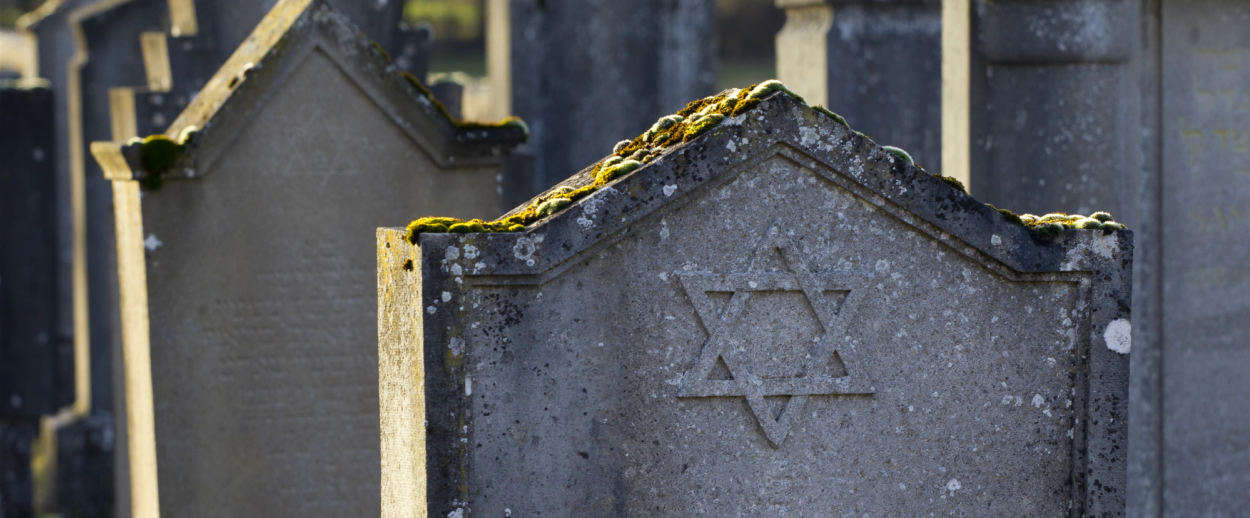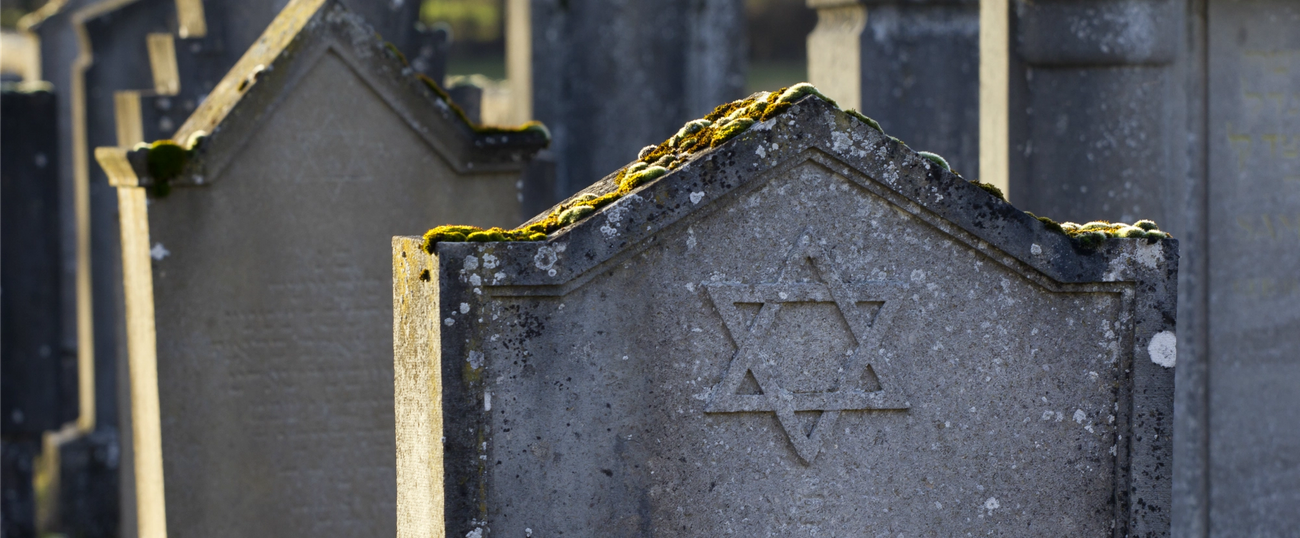My Father Calls on Me From Beyond the Grave
A son must face the daunting task of writing the epitaph for his father’s headstone




My father took care of most things in life.
He paid his bills promptly, saw the dentist with regularity, had the oil changed in his Chevy like clockwork. He was dependable until the very end, buying a burial plot for himself and my mother and for all of us—even our spouses, if they so wished.
He even took the eternal hereafter into consideration.
I have a home movie that I took at his 50th birthday party, in 1980. Quoting one of the Jewish sages, Dad said every decade of life corresponds to a day in the week. Fifty years old was Thursday: Time to prepare for Shabbes, the final rest.
So, at this period he took on the study of Mussar, a self-reflective rigorous religious discipline, in order to achieve a higher place in the next world. It guided him in this world, too: In a letter attached to his will he specified who’ll get what. The bechers and silver go to my sister Malka, the beds and the linens to my sister Ruthi, the holy books as is the custom to the first-born son, his tallis and silver atara go to the second son, Simcha, the car to another—all the way down to the computer, the microwave, and even his slippers.
But, whether by intent or out of custom, he did not specify what we should write on his headstone. Now, nearly a year after his passing, the task has fallen to us. What to write?
None of us, his children, had ever written an inscription such as this before.
I remember as a young boy, walking through the quiet of the cemeteries as I accompanied my father on his rabbinical rounds. Funerals, unveilings, and the like, over the busy tribal burial grounds of New York’s Jews: Mount Hebron in Queens, King Solomon Park, Mount Lebanon in New Jersey, Beth David in Elmont, Long Island.
The headstones, it seemed to me, read like ancient hallmark cards: Beloved father, devoted husband, loving grandfather.
Would that do for our father? He had the somitinem ponim, the silk face and soft hands of the Torah scholar, the high, lined forehead in the manner of the saintly men of Sabbath and the Day of Atonement. Should we say that on his tombstone? We were running out of time: According to tradition, the stone had to be up no later than 12 months after the deceased had passed away, and my father said his last farewell just a few hours before last year’s Rosh Hashanah.
As I pondered this problem, I found myself thinking of my father, and of the particular way he had of asking for almost anything. If he wanted a seltzer, for example, he’d say something like, “if you could be so kind and if it’s not too much trouble—I don’t want to burden you, see—could you get me a seltzer with two ice cubes in a glass? If it’s too much trouble I don’t want you to do it.” This circumlocution irritated the daylights out of me, even though I was barely conscious of it. I resented it because it pretended like I had free will to choose, even though, of course, I didn’t. I was commanded to do it. I had to get him that seltzer, just as he had asked. Refusing would’ve been an affront to God himself. And so, I rarely did. My father, I knew, wanted to feel loved by me, but there was nothing, nothing about loving him that was convenient. He mercilessly called on you and called on you and pressed you to be good, even if being good was very, very bad for you. And now, once more, I was being asked to be good, nudged gently by my saintly sister Ruthi for an answer: What to write on Dad’s headstone?
For a moment, I wanted to say that any old inscription would do—just throw in a “standard” verse from Psalms and add words like “loving and devoted husband,” or “father, teacher, grandfather,” and voila: You’ve a standard Jewish headstone.
But I kept hearing his words from the hereafter: Honor me, but only if you want to.
This post-death errand made me exhausted and irritable as much as it did when he was alive. Why did I have to think about him so much? He’s already gone to the earth in peace. At the same time, I grew ashamed of my neglect of him and of this important family task.
Spring gave way to summer. My siblings suggested a few verses, but all—forgive me—struck me as cliches. Others pitched in with ideas, but everything sounded too formal, too hackneyed, too pompous. And I myself was torn between defiant indifference and careful diligence. After all, the headstone would have to last until the Resurrection.
Finally, at the last minute, I made the same decision that I made at nearly every point in my life when it came to my father. It welled up like a wave from beneath. For some reason I couldn’t quite fathom, I decided that I did care. In fact, I cared a lot.
And so, I thought about him. About his mother, covering him in mosquito netting in their apartment on Macombs Road in the Bronx. About his father, his fingers stained with paint, holding him at the bris. About him, hyperattuned to what others wanted but skittish about his own desires and needs. With these thoughts in my head, I began to write:
Chaim son of Abraham Feuerman, our father, a rabbi in Israel, toiled at the gates of Torah and Mussar and taught thousands of students and led them in the path of the righteous over the course of 65 years.
In the morning sow your seed and do not rest your hands in the evening, for you do not know which will succeed, whether this or that, or if both will equally prosper.
September 17, 2017
Alter Yisrael Shimon Feuerman, a psychotherapist in New Jersey, is director of The New Center for Advanced Psychotherapy Studies. He is also author of the Yiddish novel Yankel and Leah.